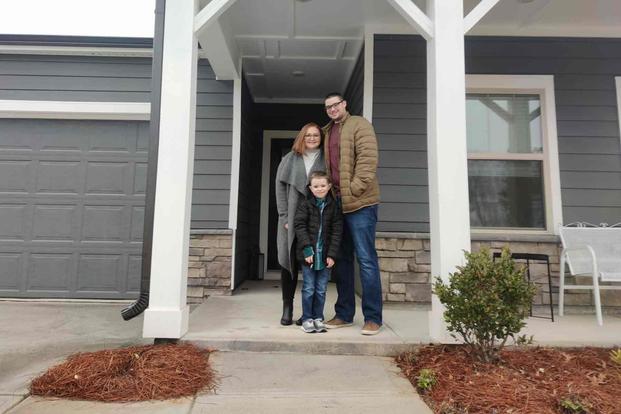When Brittany and Trevor Allison stumbled on a program that promised rent-free housing for veterans as a means to build financial security and promote homeownership, they figured their chance of being selected was akin to winning the lottery.
Operation Homefront's Transitional Homes for Veterans program "sounded nice," said Trevor Allison, a former Air Force staff sergeant, but he never dreamed they would be chosen.
The couple applied nonetheless, and when officials from the Texas-based nonprofit called to discuss their futures, they were stunned.
Read Next: VA Argues GOP Bill to Restore Veteran Gun Rights Would Harm Suicide Prevention Efforts
"It kind of hit home that we might have the opportunity to not have ... to find a random apartment in a random city to live in, that we might actually get to live close to our family in Georgia. It was kind of surreal," Trevor Allison said during an interview with Military.com.
Started in 2018, Operation Homefront's Transitional Homes for Veterans program provides rent-free housing to veterans who apply and qualify.
Applicants must be within three years of their separation date and have received an honorable discharge. They also must have some ties to the community in which they are applying to live in an Operation Homefront-owned house.
As a member of the program, veterans can live rent-free for up to three years in a home. They pay a monthly fee, determined by income, that is reimbursed at the end of their participation -- a nest egg that can be used as a down payment on a home in their community.
In exchange, veterans and their families must take part in financial counseling and receive monthly support services to pay down their debt, improve their credit scores, build up savings, and learn about the homebuying process.
According to Gracie Broll, vice president for transitional and permanent housing at Operation Homefront, the program was the brainchild of the nonprofit's Chief Executive Officer John Pray, who hoped to not only place veterans in homes, but for them to become part of their communities -- as students, employees, employers, coaches and parents.
In the program's counseling sessions, the families work with a caseworker as well as a financial adviser to establish not only their financial goals, but educational and employment goals and personal growth.
"We want to give them that stability, long term, so the program adjusts to the family's needs. It's what I love about the program; it's what I love about this organization as a whole," Broll said.
As part of the application process, Operation Homefront staff looks at whether a veteran family already has ties to the community where they have asked to be placed -- either by noting that they have secured a job there, will be attending school, or already have family or a network of friends in the area.
"We make sure that they get involved with the community because we think that's really important to the transition from military life," Broll said in an interview.
As of June, Operation Homefront has bought 43 homes for the program, the bulk of which are in Florida and Texas. The program currently serves 25 families, while another 23, including the Allisons, have graduated and gone on to buy homes in their communities.
To purchase the houses, Operation Homefront partnered with the Clark Foundation and Pillsbury and used grant money from The MacKenzie Scott Foundation to purchase homes in Texas, Florida, Alabama, Illinois, North Carolina, Georgia and Arkansas.
Before buying a home in a town, Operation Homefront reviews crime rates, school rankings, employment and educational opportunities for spouses,and the availability of Veterans Affairs health care and services.
They then select a family that matches the home and the community.
The Allisons moved into their Operation Homefront house in Waleska, Georgia, in 2021 about four miles from Brittany's parents and not far from Trevor's father. It was, Trevor Allison said, "more than we could ever ask for."
"It was a brand-new home. It was gorgeous," Brittany Allison added.
They stayed in the home for roughly 18 months, a period during which they paid off $20,000 in credit card debt and one of their two automobile loans.
They also saved money and learned enough about the homebuying process that they decided to leave the security of their rent-free home before mortgage interest rates rose, using the money they'd put aside for a down payment on their dream house in a lake community.
Trevor Allison, who does licensing for a pest control company, and Brittany Allison, a bookkeeper, said the lessons they learned in the program will never leave them, and they credit it for changing their lifetime mindsets that favored renting over homeownership.
"Seeing [our debt melt away] in such a short amount of time really took hold of us and made us realize that we are way more capable than we thought we were," Brittany Allison said.
A survey conducted in 2022 by Blue Star Families found that 49% of working-age veteran respondents who said they experienced financial stress pointed to housing costs as a top contributor.
To ease the burden for veterans transitioning from the military to civilian life, Operation Homefront has several other housing programs, including transitional apartments for veterans in Frederick, Maryland; a permanent housing program that provides veterans mortgage-free homes that have been donated to Operation Homefront; and a "villages" program that houses injured, ill or wounded service members in Southern California, Maryland and Texas.
Currently, in the Transitional Homes for Veterans program, nine houses are available -- in Centerton, Arkansas; Pensacola and Winter Garden, Florida; and Katy, Crowley, Fort Worth and Fate, Texas.
Broll said she would love to receive applications for these homes from veterans who plan to build their futures in these locales.
"We're here for you. We will walk side by side with you to get you through this transition and help you to the best of your ability," Broll said.
-- Patricia Kime can be reached at Patricia.Kime@Military.com. Follow her on Twitter and Threads @patriciakime
Related: Veterans Are More Likely to Own a Home. Here's Why.












